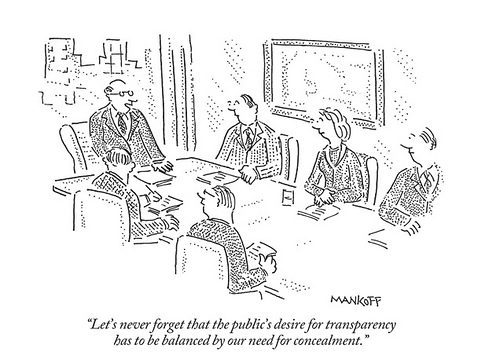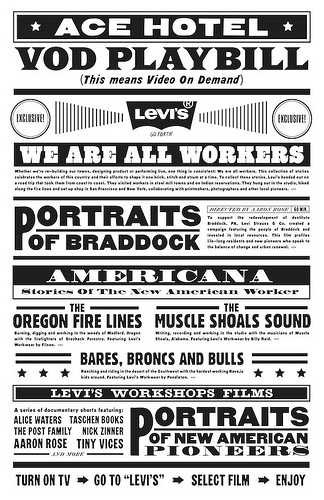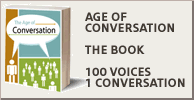
This is a nice presentation from "Account Planning Guru", Paul Feldwick, from a London TEDx conference, where he provides an interesting perspective on the problems surrounding the definition of creativity.
He touches on the obvious problem of its very intangibility making it a tough concept for business to grasp, but goes on to explain how he thinks its been wrongly pigeon-holed in the "innovation" space, which implies breakthrough thinking.
Using Elvis as an example, he shows how he wasn't especially original, but there was something about his "presence" that made him interesting.
Feldwick believes the knock-on impact, for advertising, of poorly defined "creativity" is to always push for originality. Instead, creative needs to be thinking about "artistry", rather than originality as the way to develop ideas that generate a strong emotional response.
Posted by Ed Cotton
Shows us the rise, fall and sometimes rise again of the elements that lie within of our cultural landscape.
Posted by Ed Cotton
Paul Graham's piece on Yahoo's demise is a must read for anyone looking for answers to the fail from grace of a once iconic brand.
Graham's rationale for Yahoo's failure is put down essentially one thing; its lack of a "Hacker Culture". It didn't have brilliant engineers at the heart and soul of its organization and it tried to make do without keeping and attracting the best.
Interestingly, this is the opposite of Facebook and perhaps, one can argue, the very reason for its success.
Back in October of 2009, Y-Combinator invited Zuckerberg to speak at its Start-Up School and he was asked the question about keeping and attracting talent.
This was his response.
"Our goal isn’t necessarily to keep people forever. There are companies that train people really well. A lot of Harvard people went on to McKinsey. A lot of people went to IBM because that was the best place to learn sales. A lot of people go to USC to learn how to play football. One of the things at Facebook is have a place where it’s one of the best places to learn how to build stuff. If you want to learn how to build really good products and practices and have a large impact, I would argue there’s no better place to do that than at Facebook.
If people want to come here for one, two, or three years. Steve Chen, who founded YouTube, was working on Facebook before. I’m not encouraging people to work at Facebook to leave. But I think you learn valuable skills. We’re not pretending we’re building a company that hackers are going to want to work at forever. I want to be a part of building some institutions to be great hacker institutions in the long-term."
Zuckerberg is making two things clear from this statement.
1. He wants to hire hackers
2. His promise to to his talent is clear, it's simply the best place to learn how to build stuff. If you are an engineer, what more could you ask for?
There's much more to this than meets the eye; it's the philosophy of "Hacker Culture" that not only applies to the stuff you build, but how you approach business overall.
You kind of want "hackers" everywhere, because they are never satisfied with the status-quo and always looking to improve and better things. They never sit still and they constantly making the future.
While it's easy to see why "Hacker Cultures" scare most of corporate America, but it seems like the thing that a number of companies need more of right now.
An interesting exercise could be to define and codify the hacker skills set, so it would make sense for non-engineering types.
The reality is every company one day in the very near future will need an army of internal hacker engineers.
The difference is, these won't be the "digital cowboys" in the back office, they will be running the show.
By searching the database you can looks for trends and patterns that highlight cultural shifts and changes. Some are calling this new science, "Culturomics".
As with any new shiny object, you are bound to see Planners and their interns play around and experiment with all kinds of searches on this tool and then bring their fascinating insights to client presentations and new business pitches.
I've spent about 30 minutes with it this morning and it's certainly something that you can waste a lot of time with and I am sure if you are skilled and highly insightful, it could be used to prove some points.
Here are the results of this morning's experiments.
Manufacture vs Craft
Manufacture in steep decline from the 1920s onwards, craft rising during the Second World War and again at the tail end of the century.
Suburbs
The golden age of the suburbs were the early 70s and its been downhill ever since.
Car vs. Horse
It took until 1940 for the car to overtake the horse, but interesting patterns after that; it took until the 60s for the car to rise as a cultural phenom and it continued to rise rapidly towards the turn of the century, as did the horse!!!
Posted by Ed Cotton

We already know the massive leap that was made with the introduction of smart phones to the market, but it now appears our phones are about to become even smarter.
LG are scheduled to launch their Optimus 2 into the Korean market next month and Europe shortly after. This phone has basically the same power as a PC you would have purchased in 2005.
The Optimus 2 has a dual core chip that runs at a clock speed of 1ghz- translated into a user experience, this means- faster browsing, smoother game-play, instantaneous touch and seamless multitasking between applications.
The phone also plays and records video at HD 1080p and connect to HD TVs to allow users to play games.
This LG is just the first of a whole new generation of phones that are simply much more capable than their predecessors, which has huge implications for potential advertisers. It seems safe to assume that these phones will be cable of showing richer, more engaging graphics and doing it faster.
So, think ad creative that's TV quality with added interactivity, so everyone will be creating iAd-like objects.
It's time for adland to ready themselves for a marked leap in quality of ad mobile ad content, but clients will also need to brace themselves for longer lead times and higher production costs.
However, the big question mark over all is this is the speed and power of the network.
Can it cope?
Posted by Ed Cotton
The mobile ad platform has been with us for years and given the ubiquity of phones, it seems logical that they agencies and their clients should be using the channel to connect with the audience. It just too important to ignore and too obvious to be defined as innovative.
However, for big advertisers, anything that breaks out of the mold of TV and Print is probably regarded as highly innovative.
With Lynx (Axe to you in America) announced today that it had made an iAd, it was announced with something of a fanfare.
“Lynx is always looking for new opportunities to engage with its audience in an innovative and creative way. As the digital age is upon us, iAd is the best platform for us to launch this new variant Excite to reach our target market."
Selina Sykes- Lynx Brand Manager
Keith Weed- Unilever CMO
Basically, mobile should already be a key part of any advertisers media plan and being on an iAd isn't exactly the most innovative thing you could be doing in the mobile space. What about Android? How about creating your own applications?
Doing something in mobile today is pretty much mandatory.
Posted by Ed Cotton

John Naughton in Monday's Guardian wrote about the WikiLeaks saga and concluded his piece with a statement about the new reality.
"But politicians now face an agonising dilemma. The old, mole-whacking approach won't work. WikiLeaks does not depend only on web technology. Thousands of copies of those secret cables - and probably of much else besides - are out there, distributed by peer-to-peer technologies like BitTorrent. Our rulers have a choice to make: either they learn to live in a WikiLeakable world, with all that implies in terms of their future behaviour; or they shut down the internet. Over to them.
While most of the talk has centered around the massive political ramifications of the leaks, there's also the corporate impact. Wikileaks was supposedly primed and ready to leak some very damaging internal documents from a leading bank, but It remains to be seen if this now happens.
Irrespective, of the future of the founder of WikiLeaks or of the organization itself, the trend towards greater transparency is out there as are the means to make it happen.
Corporations and their brands will have to assume a position, which will have a significant impact on their relationship with consumers in a more open, dynamic and human world.
Here are some thoughts that brands need to consider in the light of WikiLeaks
1. What do they open up and what do they close?
2. By operating a "lock down" mentality- do they risk damaging their brand?
3. How do they become more transparent?
4. What tools would they use to display and demonstrate this transparency?
5. In what ways might greater transparency provide competitive advantage?
6. How do they control employees- what can they say and where can they say it?
7. Response- How do you and should you respond to rumors?
8. How would you respond to a massive leak that reveals multiple issues?
I am assuming some of these questions might be part of a social media audit or an audit by a PR company, but I imagine they might be looking at things through different lenses, pre-Wikileaks; one might be a single issue crisis management and the other might simply be the the competitive pressure to engage in social media and the new rule sets that surround it.
A WikiLeaks scenario is a game changer that re-writes the old rules. It's a situation where company secrets are dumped on such a massive scale that they rock the core of the corporation, forcing its very existence called into question. This would be tough and an almost impossible scenario for anyone to respond to, but it's a potential reality.
However, if you have some plan in place and also make steps to becoming a more transparent organization, perhaps you could anticipate this potential nightmare scenario, a little better.
The real response from corporations to WikiLeaks, I believe will be a little different. While Naughton suggests in his Guardian piece that politicians don't really have the option to shut down the internet, inside corporations they won't shut the internet down, but access might be limited and usage monitored, lawyers will become more aggressive and there will be more of a "lock down" approach. They will do anything and everything to stop information from escaping.
The brand consultants and the legions of planners who've recently been actively arguing for their brands to be more open, will soon discover that WikiLeaks might not be the force for change they were hoping it could have been. Instead they will find clients holding it up as a reason and an excuse to do the opposite.
While the negative impact on efforts for radical transparency will be obvious, i am also going to assume that even doing interesting and more open experiments with social media has just gotten that much tougher.
Please note that the image above was stolen from Colin Drummond's Posterous.
It was way better than the original screenshot of Wikileaks
Posted by Ed Cotton
Living in a real-time world, the future seems to be happening in front of our eyes at such a dizzying pace, it's tough to make sense of it all.
GBN is a Northern California think-tank that's been making sense of the future for decades. They were even consultants on movie "The Minority Report" and came up with many of the ideas for the technology that's in the movie. I guess they saw gestural computing and touch-screens before any one else.
The way they come up with their thinking is through a technique they call "Scenario Planning". it was developed by GBN founder, Peter Schwartz back when he worked at Shell and used to predict the first oil crisis in the early 70s.
The graphic above is from a report commissioned by The Rockefeller Foundation from GBN to examine the impact of technology on international development.
No one knows what the future holds, so pretending you do is worthless, but it's also foolish for corporations and institutions to ignore the future.
Scenario Planning is a way to create a framework for a conversation about the issues by exploring and delivering a number of potential futures.
With each possible future, GBN creates narratives that look 20 years ahead and personas for specific "actors".
"The scenarios that follow are not meant to be exhaustive—rather, they are designed to be both plausible and provocative, to engage your imagination while also raising new questions for you about what that future might look and feel like."
In this report, you can see GBN has looked at the angles that surround the issues of technology today that include; privacy, control, collaboration, interaction, hacking, security threats, hacking and DIY.
While not many of us have the luxury or even the need to think 20 years ahead for our clients, there's no reason why, we shouldn't be creating short-term scenarios, given how unpredictable the short-term future is.
Posted by Ed Cotton

When your brand attracts a steady stream of other brands who want to hang out with you, you know you've got something.
This is the case with the Ace Hotel which has carved out a distinctive brand in the world of cookie-cutter hotel chains, by having a strong sense of itself and a clear understanding of its audience.
When a brand attracts an interesting audience, other brands want to connect because they desire access.
Ace clearly gets this and instead of doing the usual with its in-room TV service, it curates its own content and it's therefore not surprising that Levi's wants to be in and on that media.
I am sure the Ace Hotel wouldn't appear on any media schedule from Madison Avenue media planners and if you ask for reach and frequency numbers, the Ace might ask you what you mean, but those who know Ace, know the union makes perfect sense.
So, some questions for you and your brands
1. Does your brand attract an interesting and potentially valuable audience that could be attractive to other brands? Who do you think they are? What could you being doing together? Do you have a "media" opportunity for them?
2. Instead of thinking of the media universe think of your brand's brand universe- Which other brands are closest to yours? What connection points exist between your brand and theirs? How could you work together? Do they have "media" you could use?
Posted by Ed Cotton
It's pretty tough after such an eclectic experience to gather thoughts and make sense of it all, but I thought I would have a try, hence the above presentation.
Please consider this a very early draft that can be built upon by readers and attendees with alternate or additional perspectives.
The deck is an attempt to focus and relate the content directly to communications and branding.
It ends by asking 10 questions that I feel are good primer to see if we and our clients are approaching communication from a "Makers" perspective.
Posted by Ed Cotton
noah brier
micro persuasion
social customer manifesto
flavorpill
psfk
russel davies blog
mit advertising lab
adliterate
tom peters
church of the customer
seth's blog
the blog sits at
